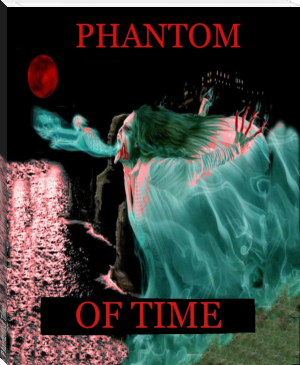The Truth about Angels - Ellen G. White (i like reading .TXT) 📗

- Author: Ellen G. White
Book online «The Truth about Angels - Ellen G. White (i like reading .TXT) 📗». Author Ellen G. White
“And it came to pass, when the angel of the Lord spake these words unto all the children of Israel, that the people lifted up their voice and wept.” “And they sacrificed there unto the Lord.” But their repentance produced no lasting results.—The Signs of the Times, June 2, 1881. {TA 113.2}
Gideon
Gideon was the son of Joash, of the tribe of Manasseh. The division to which this family belonged held no leading position, but the household of Joash was distinguished for courage and integrity.... To Gideon came the divine call to deliver his people. He was engaged at the time in threshing wheat.... As Gideon labored in secrecy and silence, he sadly pondered upon the condition of Israel, and considered how the oppressor’s yoke might be broken from off his people. {TA 113.3}
Suddenly the “Angel of the Lord” appeared and addressed him with the words, “Jehovah is with thee, thou mighty man of valor.”—Patriarchs and Prophets, 546. {TA 113.4}
The angel had veiled the divine glory of His presence, but it was no other than Christ, the Son of God. When a prophet or an angel delivered a divine message, his words were, “The Lord saith, I will do this,” but it is stated of the Person who talked with Gideon, “The Lord said unto him, I will be with thee.” {TA 113.5}
Desiring to show special honor to his illustrious visitor, and having obtained the assurance that the Angel would tarry, Gideon hastened to his tent, and out of his scanty store prepared a kid and unleavened cakes, which he brought forth to set before Him.... {TA 114.1}
As the gift was presented, the Angel said, “Take the flesh and unleavened cakes, and lay them on this rock, and pour out the broth.” Gideon did so, and then the Lord gave him the sign which he desired. With the staff in His hand, the Angel touched the flesh and the unleavened cakes, and a fire rose up out of the rock and consumed the whole as a sacrifice, and not as a hospitable meal; for he was God, and not man. After this token of His divine character, the Angel disappeared. {TA 114.2}
When convinced that he had looked upon the Son of God, Gideon was filled with fear, and exclaimed, “Alas, O Lord God! for because I have seen an angel of the Lord face to face.” {TA 114.3}
Then the Lord graciously appeared to Gideon a second time and said, “Peace be unto thee, fear not, thou shalt not die.” These gracious words were spoken by the same compassionate Saviour who said to the tempted disciples upon the stormy sea, “It is I; be not afraid”—He who appeared to those sorrowing ones in the upper chamber, and spoke the selfsame words addressed to Gideon, “Peace be unto you.”—The Signs of the Times, June 23, 1881. {TA 114.4}
Samson
Amid the widespread apostasy, the faithful worshipers of God continued to plead with Him for the deliverance of Israel.... On the border of the hill country overlooking the Philistine plain, was the little town of Zorah. Here dwelt the family of Manoah, of the tribe of Dan, one of the few households that amid the general defection had remained true to Jehovah. To the childless wife of Manoah, “the Angel of Jehovah” appeared with the message that she should have a son, through whom God would begin to deliver Israel. In view of this, the Angel gave her instruction concerning her own habits, and also for the treatment of her child.... {TA 114.5}
The woman sought her husband, and, after describing the Angel, she repeated His message. Then, fearful that they should make some mistake in the important work committed to them, the husband prayed, “Let the man of God which thou didst send come again unto us, and teach us what we shall do unto the child that shall be born.” {TA 115.1}
When the Angel again appeared, Manoah’s anxious inquiry was, “How shall we order the child, and how shall we do unto him?” The previous instruction was repeated—“Of all that I said unto the woman let her beware. She may not eat of anything that cometh of the vine, neither let her drink wine or strong drink, nor eat any unclean thing. All that I commanded her let her observe.”—Patriarchs and Prophets, 560, 561. {TA 115.2}
Manoah and his wife knew not that the One thus addressing them was Jesus Christ. They looked upon Him as the Lord’s messenger, but whether a prophet or an angel, they were at a loss to determine. Wishing to manifest hospitality toward their guest, they entreated him to remain while they should prepare for him a kid. But in their ignorance of his character, they knew not whether to offer it for a burnt offering or to place it before him as food. {TA 115.3}
The angel answered, “Although thou detain me, I will not eat of thy bread; and if thou wilt offer a burnt offering, thou must offer it unto the Lord.” Feeling assured, now, that his visitor was a prophet, Manoah said, “What is thy name, that when thy sayings come to pass we may do thee honor?” {TA 116.1}
The answer was, “Why askest thou after my name, seeing it is secret?” Perceiving the divine character of his guest, Manoah “took a kid, with a meat offering, and offered it upon a rock unto the Lord; and the angel did wondrously; and Manoah and his wife looked on.” Fire came from the rock, and consumed the sacrifice, and as the flame went up toward heaven, “the angel of the Lord ascended in the flame of the altar. And Manoah and his wife looked on it, and fell on their faces to the ground.” There could be no further question as to the character of their visitor. They knew that they had looked upon the Holy One, who, veiling His glory in the cloudy pillar, had been the guide and helper of Israel in the desert. {TA 116.2}
Amazement, awe, and terror filled Manoah’s heart, and he could only exclaim, “We shall surely die, because we have seen God!” But his companion in that solemn hour possessed more faith than he. She reminded him that the Lord had been pleased to accept their sacrifice, and had promised them a son who should begin to deliver Israel. This was an evidence of favor instead of wrath.—The Signs of the Times, September 15, 1881. {TA 116.3}
The divine promise to Manoah was in due time fulfilled in the birth of a son, upon whom the name of Samson was bestowed. By the command of the angel no razor was to come upon the child’s head, he being consecrated to God as a Nazarite, from his birth.—The Signs of the Times, October 6, 1881. {TA 117.1}
Samuel and Eli
Samuel was a child surrounded by the most corrupting influences. He saw and heard things that grieved his soul. The sons of Eli, who ministered in holy office, were controlled by Satan. These men polluted the whole atmosphere which surrounded them. Men and women were daily fascinated with sin and wrong, yet Samuel walked untainted. His robes of character were spotless. He did not fellowship, or have the least delight in, the sins which filled all Israel with fearful reports. Samuel loved God; he kept his soul in such close connection with heaven that an angel was sent to talk with him in reference to the sins of Eli’s sons, which were corrupting Israel.—Testimonies for the Church 3:472, 473. {TA 117.2}
The transgressions of Eli’s sons were so daring, ... that no sacrifice could atone for such willful transgression.... These sinners conducted the ark to the camp of Israel.... {TA 117.3}
God permitted His ark to be taken by their enemies to show Israel how vain it was to trust in the ark, the symbol of His presence, while they were profaning the commandments contained in the ark.... {TA 117.4}
The Philistines were triumphant, because they had, as they thought, the famous God of the Israelites, which had performed such wonders for them, and had made them a terror to their enemies. They took the ark of God to Ashdod, and set it in a splendid temple, made in honor of their most popular god, Dagon, and placed it by the side of their god. In the morning the priests of these gods entered the temple, and they were terrified to find Dagon fallen upon his face to the ground before the ark of the Lord.... The angels of God, who ever accompanied the ark, prostrated the senseless idol god, and afterward mutilated it, to show that God, the living God, was above all gods, and before Him every heathen God was as nothing.—Spiritual Gifts 4a:106, 107. {TA 118.1}
The men of Beth-shemesh quickly spread the tidings that the ark was in their possession, and the people from the surrounding country flocked to welcome its return. The ark had been placed upon the stone that first served for an altar, and before it additional sacrifices were offered unto the Lord.... Instead of preparing a suitable place for its reception, they permitted it to remain in the harvest field. As they continued to gaze upon the sacred chest and to talk of the wonderful manner in which it had been restored, they began to conjecture wherein lay its peculiar power. At last, overcome by curiosity, they removed the coverings and ventured to open it.... {TA 118.2}
Even the heathen Philistines had not dared to remove its coverings. Angels of heaven, unseen, ever attended it in all its journeyings. The irreverent daring of the people of Beth-shemesh was speedily punished. Many were smitten with sudden death.—Patriarchs and Prophets, 589. {TA 118.3}
Saul and Jonathan
God had raised up Samuel to judge Israel. He was honored by all the people. God was to be acknowledged as their great Head, yet He designated their rulers, and imbued them with His Spirit, and communicated His will to them through His angels.—Spiritual Gifts 4a:67. {TA 119.1}
Because of Saul’s sin in his presumptuous offering, the Lord would not give him the honor of vanquishing the Philistines. Jonathan, the king’s son, a man who feared the Lord, was chosen as the instrument to deliver Israel.... {TA 119.2}
Angels of heaven shielded Jonathan and his attendant, angels fought by their side, and the Philistines fell before them.—Patriarchs and Prophets, 623. {TA 119.3}
Angels of God fought by the side of Jonathan, and the Philistines fell all around him. Great fear seized the host of the Philistines in the field and in the garrison.... The earth trembled beneath them, as though a great multitude with horsemen and chariots were upon the ground prepared for battle. Jonathan and his armor-bearer, and even the Philistine host knew that the Lord was working for the deliverance of the Hebrews.—Spiritual Gifts 4a:70. {TA 119.4}
David’s Early Years
Samuel came no more to Saul with directions from God. The Lord could not employ him to carry out His purposes. But He sent Samuel to the house of Jesse, to anoint David, whom He had selected to be ruler in place of Saul, whom He had rejected. {TA 119.5}
As the sons of Jesse passed before Samuel, he would have selected Eliab, who was of high stature, and dignified appearance, but the angel of God stood by him to guide him in the important decision, and instructed him that he should not judge from appearance. Eliab did not fear the Lord. His heart was not right with God. He would make a proud, exacting ruler. None were found among the sons of Jesse but David, the youngest, whose humble occupation was that of tending sheep.—Spiritual Gifts 4a:77, 78. {TA 120.1}
David was not of lofty stature; but his countenance was beautiful, expressive of humility, honesty, and true courage. The angel of God signified to Samuel that David was the one for him to anoint, for he was God’s chosen. From that time the Lord gave David a prudent and understanding heart.—The Spirit of Prophecy 1:368. {TA 120.2}
David’s eldest brother, Eliab, ... was jealous of David, because he was honored before him.





Comments (0)